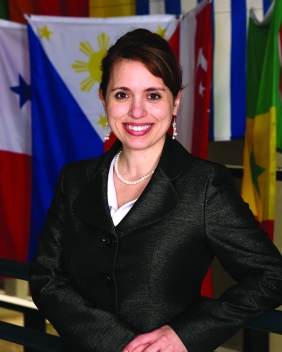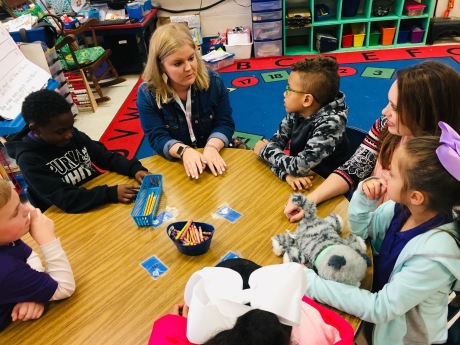Southeastern’s College of Education houses an innovative and unique program that helps enable educators to teach within the International Baccalaureate (IB) curriculum at the elementary, middle, and high school levels. After successful completion of courses leading to the IB Educator Certificate in Teaching and Learning, candidates may apply for their level of certification through the International Baccalaureate Organization (IBO) in Geneva, Switzerland. Only 45 universities in the world and 12 in the United States offer this.
The IB program started in 1968 after World War II. Diplomats were moving their families from country to country and realized that moving their children caused them issues with schooling. They wanted a universal but also rigorous curriculum so that when students moved from school to school, they didn’t fall behind or lose credits. The IB program helps students master skills within a core group of 10 principles:
• Inquirer
• Open-Minded
• Knowledgeable
• Caring
• Thinker
• Risk Taker
• Communicator
• Balanced
• Principled
• Reflective
“The International Baccalaureate program is designed not only to get students to college, but also through college,” said Cherissa Vitter, assistant professor in the College of Education. “All students at schools offering the IB program benefit from the learning strategies upon which the program is built. They actually learn how to learn. When students learn how to learn, they are in control of their own education.”

LAUNCHING HAMMOND
Vitter came to Hammond on a mission—to implement IB programs for this part of the state. Challenged with a community expectation that Hammond High School would become a regional destination school, she went to work right away and helped launch a new way of thinking in her role as IB coordinator.
Various elements of the community (business, education, and community at large) worked together to think differently and create a new school with no boundaries to student learning. The business community realized building good schools would be good for the region and the regional economy. This required a heavy investment in the Hammond schools both financially and cognitively. Vitter says that it was worth the effort. The word was out—Hammond schools now host the only IB continuum in the state of Louisiana, offering a world–class education to every student ages 3-19.
“The community was anxious to make improvements at Hammond High,” Vitter said. “We wanted to respond to those community needs. And the students at Hammond High felt valued and heard. We had to train this mindset from within. Everyone at Hammond High would be trained in the program, and big changes were coming.”
Greg Drude, Hammond real estate agent and recent inductee to Southeastern’s Educator Honor Roll, was instrumental in helping to bring IB to Hammond High. “I had spoken with several community leaders, especially through the Greater Hammond Chamber of Commerce, and people were moving out of the area,” Drude said. “Good schools promote people coming in. We tested a program at Hammond Eastside Elementary Magnet School that produced high scores and results, and when that happened, we knew it was time to grow opportunities for children in the area.”
In just a few years, Hammond High Magnet School fully implemented the IB program and catapulted to national recognition, boasting students who experience school differently, capitalize on their own talents, and reflect on the learning process.
“It’s a strenuous program,” Drude said. “Kids are challenged in IB, and they have the work ethic to succeed. There is trickle down success for everyone at the school.”

Educator Certificate class, gains hands-on experience while participating in the program.
SOUTHEASTERN JUMPS IN
As the Hammond schools improved, Southeastern Louisiana University administration was paying attention and quickly saw the value in the program. The university soon committed to developing courses that would lead to IB certification for educators.
“It’s an investment by the university to do this,” said Kate Kuhn, professional services manager, IBEC, International Baccalaureate Organization. “When the number of IB World Schools expands, there will also be an increasing need for educators who have a deep understanding of how to teach in an IB context.”
Southeastern now has the curriculum in place to help train teachers to become IB educators. The graduate program offers multiple tracks leading to the IB Educator Certificate in Teaching and Learning. Vitter says the certification opportunities are yielding global attention.
Dean of the College of Education at Southeastern Dr. Paula Calderon said, “Southeastern’s teacher education program is well respected throughout the state and nation, and I was proud to relay that during a recent presentation to the Board of Elementary and Secondary Education. With the IB educator certifications, we have an added opportunity for student success with graduates who will be using IB best practices whether they end up teaching in IB schools or not.”
Calderon noted that this additional certification allows teachers to work in IB schools all over the world, and it also invigorates those who are teaching at schools that do not adopt this programming. “Teachers who go through IB certification learn how to readapt on their feet, adjusting strategies during their lessons when they recognize specific needs of students,” she said.
At Southeastern, Vitter is working to continue growing opportunities for would-be teachers and those wishing to continue their education. To become an IB educator, teachers must attend IB training to keep that consistency in the program on the global scale.
“We offer five tracks at Southeastern, and IB has awarded 15 certificates to Southeastern students so far,” Vitter said. “We have university students from all over the world who now have Southeastern on their resumes. It’s quite an honor.”
Additionally, Southeastern has been instrumental in ensuring that the high school students who receive the IB diploma have an easier admissions process going on to college. Vitter credits Southeastern’s Assistant Vice President for Academic Programs Dr. Jeff Temple for helping to develop the admissions process for these students, an initiative that has now been heralded by the International Baccalaureate organization and adopted at many universities.
RESULTS
High schools that adopt IB programming don’t just do so for a few of their students; the entire school benefits. All teachers must gain certification and training, and this touches every student enrolled. “Hammond High is not a regular high school with a select group of students who go through IB,” Vitter said. “Everyone there benefits, from the students to administration.”
Since launching, the results have been very positive. Students and teachers have been recognized nationally; over 90 percent of those who finish the IB program become college graduates; the schools have now been recognized in the region for their academic strength; and as a note of success, recent planning meetings for IB’s 2019 global conference in New Orleans have been held at Hammond High, putting it on a global stage and recognizing its achievements.
Calderon says offering the IB educator program at Southeastern demonstrates forward thinking. “As we become more mobile and our teachers begin moving to other parts of the country and the world, they take this certification with them,” she said. “Our Southeastern graduates with this certification won’t have to seek other credentials because this certification is recognized worldwide. We can also be a resource as IB programs continue to grow in our area. If local schools want to become IB schools, Southeastern can provide training. This is a benefit not only for our university, but also for schools and students throughout the region.”
Southeastern again finds itself at the heart of innovation that spurs positive regional impact.

